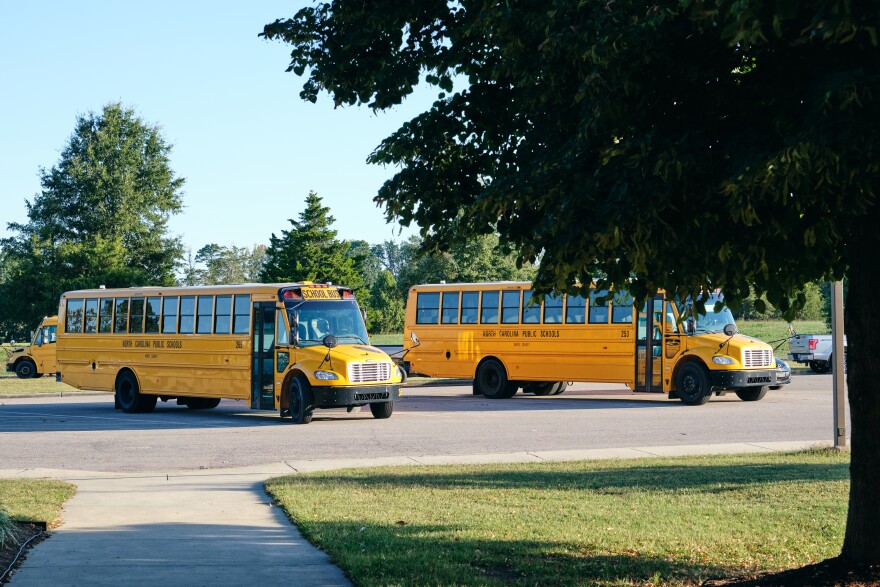At 4:45 a.m, Nicole Smith wakes up and heads to the Durham Public Schools’ bus compound to start her day as a bus driver. When the kids are all dropped off at school around 9 a.m., she pulls back into the lot and transitions to the next phase of her workday.
“When I leave here I go home and put on office attire,” Smith says. “That's when I'll start my real job.”

Her main job is being the school board's executive assistant. Smith has worked for Durham Public Schools for more than a decade, and she had no plans to drive a bus until one board meeting last spring.
Bus drivers came to speak about their pay and the shortage of drivers. It inspired her to become a substitute driver.
“I believe that everybody, every position in a district is a very important and very integral part of student success,” Smith says. “Because in order for them to be successful in school, they need to get there.”
Many North Carolina schools are still dealing with an acute bus driver shortage, months into the school year. Some days it reaches the worst-case scenario.
This semester, Durham Public Schools reports that it's had to outright cancel some bus routes on two days due to a lack of drivers. Chapel Hill-Carrboro City Schools says it has had to do that eight times. Wake County Schools, which serves a much larger student population, reports that every day this semester it has had to cancel at least one — and sometimes up to 60 — of its nearly 2,000 daily trips. On many more days, understaffed buses at these districts run too late to get students to school on time.
Smith says any day she’s available, there’s a route to fill in. Durham Public Schools is still hiring for 70 positions this late in the semester. School districts rely on substitute drivers every day, but during cold and flu season, absences are spiking.
School districts raise pay, increase number of trips per driver
“We are currently operating at nearly a 100 driver reduction of what our workforce was before the pandemic,” says Mathew Palmer, executive director of School Planning, Transportation & Nutrition at Durham Public Schools.
Although drivers continued to be paid while schools went remote, many moved on to other jobs in a competitive labor market. Numerous school districts, including Durham and Wake, have offered signing bonuses and raised starting pay in recent years.
Pay for school support staff comes mostly from general state education funding. State officials set the salary ranges for bus drivers that can be supported by state funding. Local school officials can supplement that with more local funding, but they say there's only so much they can do to raise driver pay.
Smaller, rural school districts are pinched for driver pay because they tend to have smaller local salary supplements. And large, urban school districts are pinched because they need higher pay to compete with other employers — like city buses, Amazon, and Uber.
Durham Public Schools has used local funds to increase its starting bus driver pay up to $18.15, among the highest for schools in the state. For this fall, the district also redesigned its bus routes and changed its school start times so that drivers can run up to three trips back and forth every shift.
That makes buses more susceptible to running late, but Palmer says it's also been a huge help.

“That realignment of the bell schedule has been enormous in our ability to continue to offer service,” Palmer says.
For years, Wake County Public Schools has operated on a system where many drivers run up to four back-and-forth trips to school every shift. When this school year started, the district was short 266 bus drivers. District spokeswoman Lisa Luten says there isn’t enough capacity for the current drivers to run longer routes.
“The hours a bus driver can work are exhausted,” Luten says.
“There is no easy button here,” Palmer says. “It's not easy to go out and replace 50 or 100 school bus drivers.”
State education officials seek funding to address DMV delays that hold up would-be applicants
A bus driver in North Carolina has to complete a class at the Department of Motor Vehicles and pass exams to earn a commercial driver's license plus a certificate to carry passengers. It took Smith a little less than six months to become fully licensed.
“It absolutely can take a long time, and I think a lot of it too, is because of the shortage that DMV is having right now,” Smith says.
Local and state education officials say understaffing at the DMV is holding up applications. Someone who urgently needs a job might give up on applying.
The Department of Public Instruction plans to ask state lawmakers to fund more DMV positions in the next state budget.
“We do feel that there's very low hanging fruit here [in] hiring more people to do the certifications, expanding the hours at the DMV to do this,” says the DPI's Director of Governmental Affairs Jamey Falkenbury.
State education officials are also looking at ways to give districts more funding flexibility so they can use existing funding to raise drivers’ salaries and access to benefits.
Bus driver shortage means lost class time for students, strain on parents
But these are not overnight solutions, and the shortage is affecting students now. Ryan Walquist is the father of two Durham Public School students.
“This fall, my boys were late to school a lot of days of first quarter, I would say most of first quarter,” Walquist says.
Walquist says his kids were getting to class after the bell rang, missing assignments — and it was disrupting his life too. He has occasionally taken time off work and lost hourly pay to drive his kids to school on time.
“We're a two car family and two parents and two jobs, and one of those jobs is very flexible,” Walquist says. “I can't imagine if I were, say a classroom teacher, who could not be late for work. I can't imagine the stress that I'm sure other parents are feeling on this.”
Other parents have reached out to their schools and to their state representatives looking for some relief as soon as it can come.


